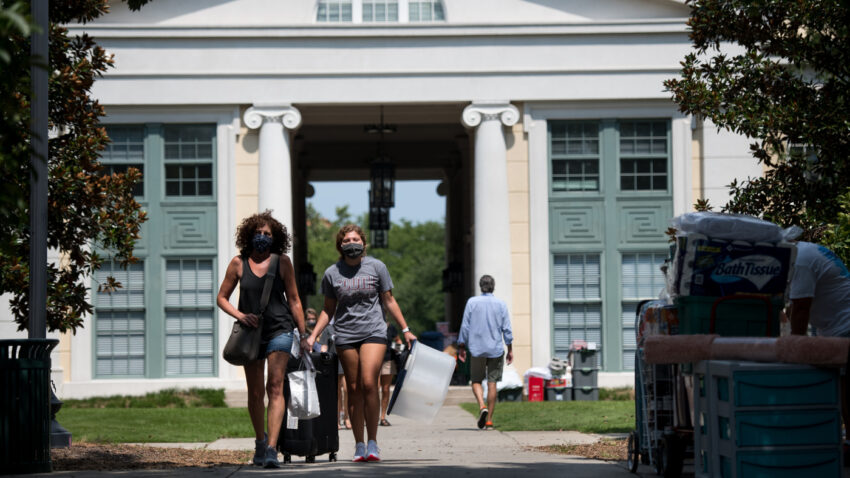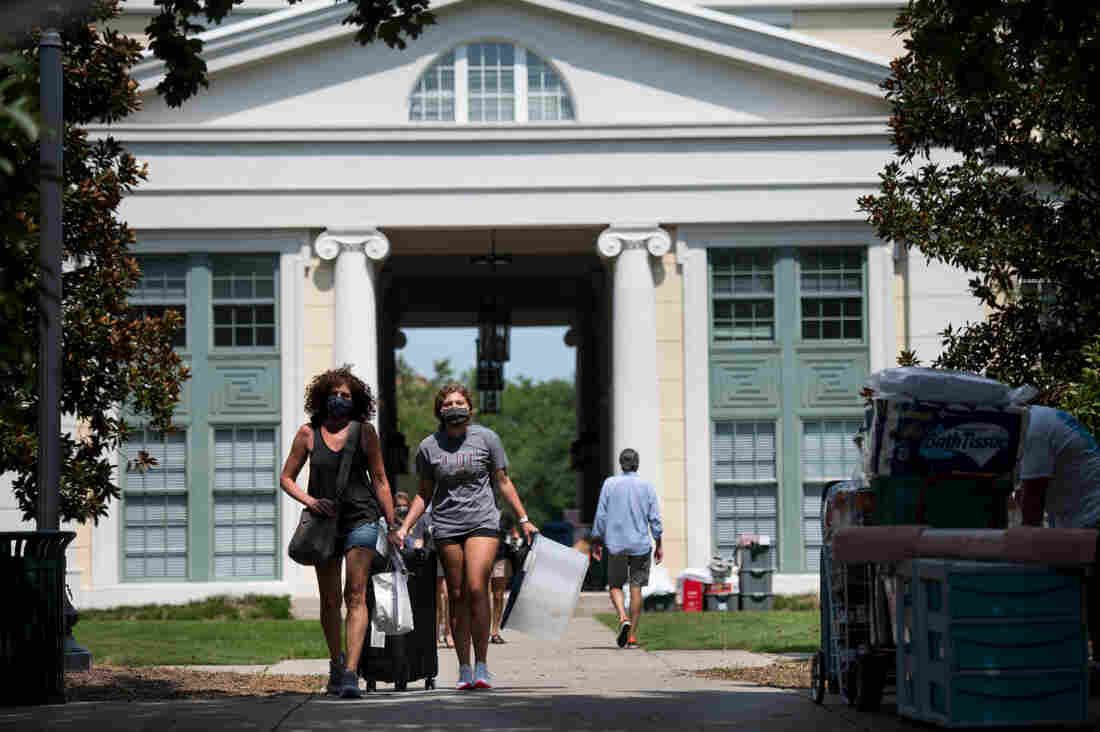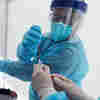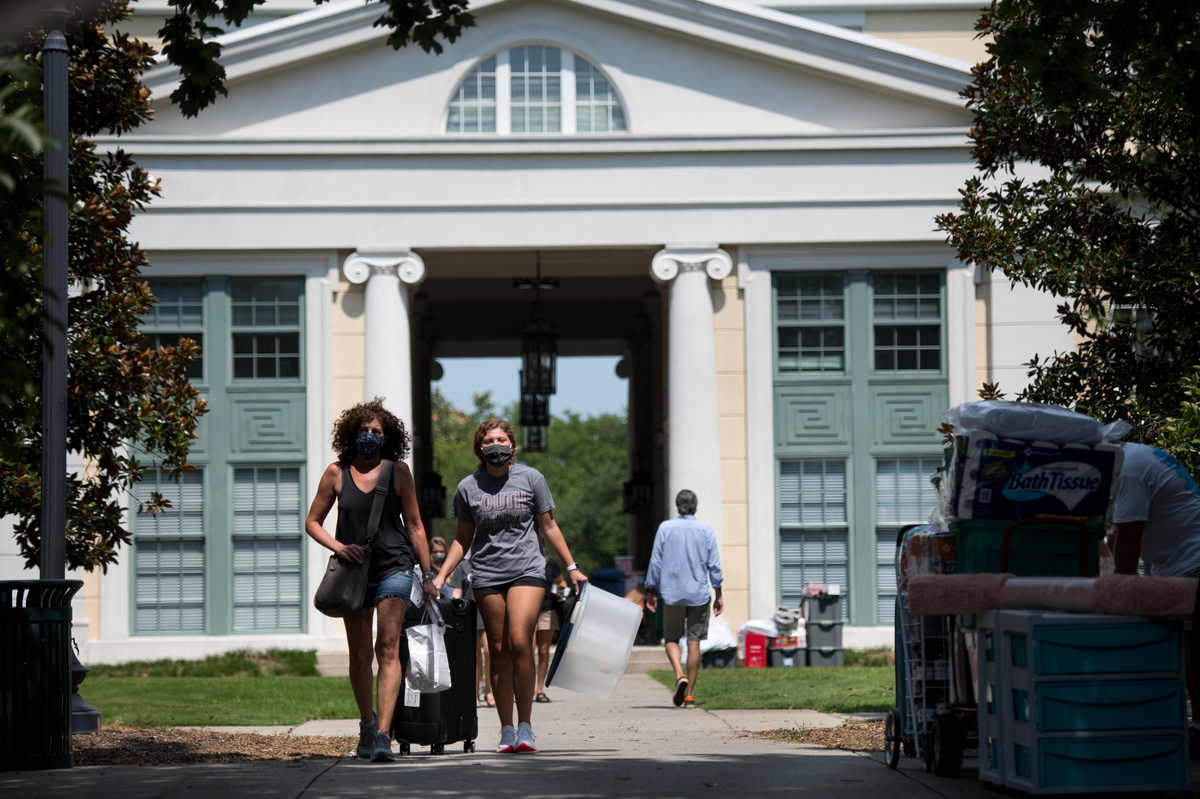

As some campuses welcome school college students encourage, directors are weighing their alternate options to abet the group true. Some are having a bet on frequent, odd finding out.
Sean Rayford/Getty Pictures
camouflage caption
toggle caption
Sean Rayford/Getty Pictures
As some campuses welcome school college students encourage, directors are weighing their alternate options to abet the group true. Some are having a bet on frequent, odd finding out.
Sean Rayford/Getty Pictures
As school college students return to the campus of College of Illinois at Urbana-Champaign this month, they are going to be examined for COVID-19. And, then they are going to be examined, once more.
“We’re requiring finding out two circumstances per week for safe admission to to campus services. Here is for school college students, school, and personnel,” explains Rebecca Lee Smith, an affiliate professor of epidemiology.
The faculty is one amongst a number of starting formidable finding out regimes — a number of utilizing proprietary finding out expertise — with a opinion to allow school college students to soundly return to campus.
The College of Illinois is utilizing a saliva-primarily primarily based check developed by a evaluation group on campus. School college students will safe the outcomes inside hours. And their first check upon arrival will function an “entry check”, to make sure they’re wholesome when returning to campus
“These residing within the dorms will seemingly be examined at test-in. Others are requested to return to a finding out location as shortly as possible,” Smith says.
This finding out strategy is in accordance with the most recent proof that frequent finding out can discount stop outbreaks on campuses.
“Fleet and frequent, that is completely principally probably the most essential,” says Martin Burke, a professor of chemistry at Urbana-Champaign, who helped embrace the saliva-primarily primarily based check. No longer most partaking is it a lot much less invasive to amass a saliva pattern, when in distinction with doing a nasal swab, Burke and his collaborators keep developed a streamlined course of within the laboratory that ends in quicker outcomes, about three to six hours on common.
Here is essential, Burke says, as a result of that intention the campus “can swiftly isolate people who examined sure.”
This type or odd finding out regime is by no intention the norm. Many schools are planning on holding classes on-line most partaking this autumn; others are planning a single entry check sooner than the semester begins; others will do not require any asymptomatic finding out. Nonetheless some campuses are having a bet on biweekly finding out, utilizing a model latest interval of quicker checks.

And, why two checks per week? Coronavirus diagnostic checks are inclined to take people most partaking at some stage of a transient window as soon as they’re most infectious. So, a newly contaminated particular person can also honest check adversarial if the pattern is taken too early, sooner than the virus has begun to repeat of their physique. Nonetheless, in the event that they’re examined once more a few days later, the virus would seemingly be detected.
“So, by finding out repeatedly the chances of catching that particular person when their viral load goes up is terribly extreme,” Burke says.
Some researchers converse it’s time for schools to embody finding out. “The case for frequency is terribly strong now,” says Rochelle Walensky, an infectious illness physician and a professor at Harvard Scientific College. “Making an attempt out is that this type of major ingredient of what can be carried out to safe us to an excellent greater construct of residing on school campuses, and it’s being totally underutilized appropriate now,”she says.
As part of a latest witness printed in JAMA Community Begin, Walensky and her collaborators modeled assorted eventualities for safely re-opening campuses. They discovered that merely asking school college students to doc indicators would not be satisfactory.
“We ran 1000’s of eventualities in our mannequin and we did not safe even one believable circumstance beneath which a capability of merely looking forward to indicators to emerge may maybe maybe perchance be satisfactory to thrill in a plague,” says Walensky’s co-creator, David Paltiel a professor of public successfully being at Yale College of Treatment.

The rationale: “There may be honest lots tranquil spreading,” Paltiel says. A latest prognosis printed in PNAS discovered that tranquil illness transmission at some stage of the presymptomatic and asymptomatic levels are accountable for almost all of situations.
Paltiel and Walensky’s paper concludes that, at the side of social distancing and overlaying, frequent finding out of all school college students can be required to manipulate outbreaks. And so they produce that “low sensitivity” checks which could maybe abolish extra flawed negatives are acceptable.
“You’ll additionally rob a overwhelming majority of the situations in a really quick time by many circumstances finding out,” Paltiel says. He says resistance to quicker, a lot much less delicate checks is a mistake. “The frequency makes up for an world of blemishes almost regarding the accuracy of the check,” he says.
No matter the rising name for extra finding out on campuses, presently, the CDC wouldn’t advocate “entry” finding out for all returning school school college students.
Paltiel says this steerage can be unhealthy. “It’s miles baffling to me that the CDC has did not replace its steerage, in mild of the accumulating proof that “tranquil spreaders” are fueling outbreaks,” he says.
The CDC steerage says that entry checks keep not been systematically studied.
“An absence of proof is not very any longer the the identical ingredient as proof of a scarcity of effectiveness,” says physician Aaron Carroll, a professor at Indiana College College of Treatment. “From a public successfully being perspective, each case we identify and isolate is healthier than not.” He argues entry finding out, particularly for on-campus school college students,”combined with a sturdy program of ongoing, odd finding out of as many people as possible, seems to be like cherish a applicable recommendation.”
The CDC’s steerage on campus finding out grew to become as soon as final up thus far in gradual June. Now, because the proof continues to evolve, a spokesperson for the company tells NPR they are going to re-evaluation the steerage in mild of the latest evaluation. “CDC will incorporate this [JAMA Network Open] witness into the physique of scientific proof to this stage regarding entry finding out for school school college students and may maybe maybe nicely honest proceed to believe the steerage,” a spokesperson wrote in an e mail.
The company components to many parts to take care of in ideas at the side of “puny availability of devoted sources and the logistics wished to habits immense finding out” on campuses.
Or not it is moral that with latest finding out expertise and current chain shortages, many campuses would not be able to shuffle frequent checks for all school college students.

And the types of snappy saliva checks some schools keep developed are not however available on the market. College of Illinois is presently looking for emergency train authorization from the FDA for its proprietary check, and Yale College is asking for authorization for a really an identical check.
Researchers at these establishments converse the subject has been to incorporate a check that may not be space to abolish chain snags — and may maybe maybe nicely disclose outcomes quicker and extra cheap. They’re saying they’ve discovered a capability of working spherical a time-drinking step within the lab prognosis of samples, by way of the usage of warmth to “atomize starting” the virus.
“We set away with principally probably the most cumbersome step,” says Nathan Grubaugh, an assistant professor of epidemiology at Yale College of Treatment. “You lose principally the most expensive step and principally probably the most time-drinking.”
The latest methodology cuts down severely the quantity of professional labor required, every in pattern sequence and lab processing, he says. If permitted, these checks may maybe maybe perchance become extra smartly-liked considerably swiftly, as industrial labs can also honest starting as much as license them.
Inside the interval in-between, Carroll says his school, Indiana College, is ramping up its surveillance and screening utilizing a mixture of saliva checks and antigen checks. “We’re finding out all on-campus school college students in all our campuses utilizing antigen finding out on arrival,” he explains, and the college is rising plans for ongoing finding out.
An antigen check, which could maybe detect proteins from the virus, can rob up clever infections and current leads to decrease than an hour. The FDA says these are first rate if outcomes are sure however adversarial outcomes “can also honest should be confirmed with a molecular check.”
And at some stage of the nation, campuses proceed to change their finding out plans. Harvard College is phasing in latest finding out protocols: Beginning Aug. 16 school college students residing on campus dorms and housing will seemingly be examined three circumstances each week. School college students residing on campus at Brandeis College will seemingly be examined two circumstances per week (each three or 4 days).
By comparability, on the College of Georgia, which typically enrolls about 30,000 undergraduates, asymptomatic finding out is voluntary, and the faculty says it plans to habits about 300 checks per day.
















